 |
| My first cup of Tim Horton's in Canada |
Cruising the pristine waters of the Trent Severn Rivers, Georgian Bay, and the North Channel in Canada is one of the main reasons we bought a boat. We even launched our boat in Northern Michigan in June 2020 in hopes that Canada would open her borders last summer. We all know that didn't happen. This year, we started in Cape May New Jersey, mainly to time our arrival in New York for Canada's proposed border opening on June 21st. When that didn't happen, we turned Green Eyes slowly north and cruised to the top of Lake Champlain, almost touching the Canadian Border, then waited in Burlington, Vermont for a rumored opening on July 5th. When that didn't happen, we turned south and cruised the Eastern Erie, getting stuck for two weeks at different locks because of weather and flooding. As serendipity would have it, this turned out to work in our favor. The delay brought us to Oswego, NY in time to cross Lake Ontario, our second Great Lake, for a proposed border opening to fully vaccinated Americans on August 9th. That opening did happen.
We arrived in Clayton, New York with a few days to spare. To enter Canada, we would need our COVID vaccination cards showing that we were fully vaccinated. We would also need a rapid result negative PCR test within 72 hours of arriving at the border. We also had to show Pika's rabies vaccination records, which we already had with us. Obtaining a rapid result PCR test was the most challenging part of the equation as the pharmacy in the village of Clayton only offered the mail-in version, which would take far too long. As is often the case in our travels, success came because of the kindness of a stranger, in this case, none other than the Mayor of Clayton, New York.
As luck would also have it, we arrived in Clayton for the start of the Antique Wooden Boat Show weekend. We tied up at the dock at 5 P.M. and headed to the Wooden Boat Museum to find it had just closed for the day. A woman named Norma Zimmer came out the door and said, "You must come back tomorrow, there's so much to see." We walked down the street together, Norma telling us all about the sights to see in Clayton. "You sure know a lot about the town," I said. "Well I should," said Norma. "I've been the mayor of the town for fourteen years." We parted ways at her charming home on the main street, thanking her for all the information.
Norma saves the day:
The next day, as we bought our three-day passes for the boat show, Norma approached us. "How are you enjoying our little village?" she asked. "We love it!" I answered honestly. "Of all the stops we've made on the Great Loop, Clayton appeals to me the most as a great place to live. In the summer. The only thing lacking," I added, "is an Uber or taxi service. We need a rapid PCR Test to enter Canada on the 9th and the only place we can get it is in a town 30 miles away." "Well, we do have a lady that gives drunk people rides home. Let me call her and see if she can take you. What's your phone number? I'll call you." We thanked the Mayor and walked to the waterfront to schedule a ride on one of the antique wooden boats. While we were waiting to buy our tickets, Norma called. "The drunk van is otherwise engaged this weekend. Why don't you just take my car?" she offered. Norma had just earned the Best Mayor in America Award, as far as we were concerned.
The next morning, Norma brought her car to the marina, gave us a Clayton bag with the town tartan on it, and handed us her car keys (far better than the keys to the city.) We drove to Watertown for our test where all went smoothly and we had our negative results emailed to us within 24-hours. The dock master printed the results for us, along with Pika's vaccination records, and we were good to go, all thanks to Norma Zimmer, a truly special person, and at 86, fit as a fiddle, sharp as a whip, and kind as can be.
On the morning of August 9th, we cruised a short distance and crossed the border at Gananoque, a port of entry in Canada. We called the Canadian Customs number posted at the dock and were told to remain on our boat and proceed to the nearby marina. A few hours later, two border agents approached Green Eyes. They scanned our passports and documentation, issued a hearty "Welcome to Canada!" and gave us a 12 digit customs number that would be attached to us for the time we were in Canada. We were the first boaters they had seen, though they said they were processing 200 cars entering by land at the bridge that morning. "Mostly grandparents coming to see family they haven't seen in a year because of COVID."
 |
| The first Canadian we encountered was a Police Officer named Sean who welcomed us to Canada in our port of entry, Gananoque |
We left the marina to find a nearby anchorage, ecstatic to be in another country after so long. A French-Canadian couple on jet skies waved us down to ask directions. "Je ne sais pas," I said with what I felt was an appropriate French gesture of 'I don't know'; arms bent with empty palms pointing at the Heavens. We felt fortunate to finally be in Canada, and a little uncomfortable too. Uncomfortable because, though promised, America did not reciprocate on a border opening to fully vaccinated Canadians. Here it is September 12, 2021 and the U.S. still hasn't opened to Canadians. Most Canadians are happy to see us. There's shouts, smiles, and waves from passing boats, "Welcome to Canada!" but others are understandable miffed. They have grand kids to visit across our border too.
We were glad we persisted and insisted that Canadian waters be part of our Great Loop. (Most Loopers did not wait around for a Canada opening this year and continued down the Erie Canal to Lake Erie.) At anchor in a small bay with two Canadian boasts that night, we swam and toasted our mission-accomplished feeling with G&Ts. The clear, clean water was sublime. It was hot, so the folks on the other boats swam next to their boats too. We thought we detected French accents across the water.
First French-Canadian sighting:
The next morning, I awoke early as I routinely do, to watch the sunrise on the back deck. Scott joined me. "Oh look. The man on the sailboat is going for a morning swim," I said to Scott as we watched a thin, spry man climb down his stern ladder. Only it wasn't a swim he was going for. Halfway down the ladder, he grabbed on to the swim railing with one hand, while the other hand pulled down his trunks so he could perform a lake water douche on his nether regions. "Yep. They're French," I confirmed.
The Trent Severn Waterway:
The Trent Severn consists of 44 locks along its scenic waterway. Two are lift locks. You have to see a lift lock to believe it. The lift locks differ from the regular locks because instead of maneuvering our boat into a lock chamber and securing our lines to cables hanging on a wall and waiting while water is let in or let out of the chamber (as we've done over 60 times already on the Loop), lift lock chambers actually lift all the water in the chamber, like an elevator, to the next level. Sixty-five feet in the case of the Peterborough Lock. Five stories high! As I drove out of the chamber, I thanked the lock operator saying, "That was an e-ticket ride!"
But that was nothing compared to the lock called the Big Chute Marine Railway. In that lock, Scott drove Green Eyes over gigantic straps laid down on a slightly flooded railway car. "Close the seacock! Bring in the fenders!" I shouted because the boat was about to be lifted by the straps and carried over land, high and dry, then deposited onto the river on the other side. Utterly amazing. Unique. Heart-pounding. Thrilling!
 |
| Big Chute Railway |
In between the excitement of the locks on the Trent Severn Waterway (TSW), we were surrounded by natural beauty. We often tied up to the walls above whichever lock we arrived at 5 P.M. and went for a swim before dinner.
It was very hot during our traverse of the TSW so swims were a necessity. Kwartha Ice Cream was almost a daily treat. But the best thing about the TSW were the visits by Canadian friends. I hugged them embarrassingly long, but after such a long time in lockdown, I felt the need. John and Liz, who we first met in Antarctica, met us in Peterborough bearing delicious wine and fresh picked sweet corn. Angel met us in Bobcaygeon with a gift basket filled with so many Canadian treats, it barely fit through the doorway of Green Eyes.
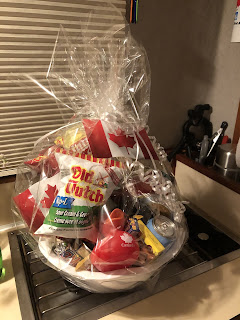 |
| Angel swag basket is the best swag |
 |
| John and Liz drove 3 hours to meet us in Petersborough |
 |
| Dinner with appropriately named Angel |
At the end of 44 locks, we were finally in Georgian Bay, the world's largest freshwater archipelago, containing 30,000 islands. We managed to miss them all, except one. I blame it on Echo Bay. More specifically, our blissful anchorage in Echo Bay that left us with such a relaxed feeling that our guard was let down. I mean, it was perfect. The water was so clear, we could almost see our anchor 12' below. At night, the moon and stars reflected on the completely still water. I've never seen that before. We were even inspired to take a midnight swim in our birthday suits, as if we were young or something. I call our boat the Honeymoon Boat because it's so small we are always touching one another, whether we want to or not. A few nights before anchoring at Echo Bay, we stayed in a place called Honeymoon Bay, which is really where our feelings of bliss brain began. Too much perfection can be a bad thing.
 |
| Leaving Echo Bay anchorage in the morning way too relaxed. |
 |
| At anchor in Echo Bay |
 |
| Honeymoon Bay |
 |
| It kind of all started in Honeymoon Bay |
In the morning, we pulled the anchor, turned out of sheltered Echo Bay and continued our cruise westward towards Parry Sound. It was a picture perfect dawn. There wasn't a cloud in the sky and not a whiff of a breeze. We were so relaxed. For once, instead of staring at the digital chart on the iPad or at the Garmin, the two devices that show red and green buoys, hazards to navigation, and depths, we took in the beauty of the channel. Granite and pine trees met the water, our favorite natural landscape. Scott pointed out a rock he would choose to lay out on and dry in the sun after a swim. I noted how clean and fresh the day looked. How blue the sky was and how green the trees. How the water was so clear and calm, it almost felt like we were floating above it. The channel narrowed. I looked ahead. "That's weird. There's two green markers but no red." Red buoys are on the right and green on the left and boats are supposed to travel between them. "Yeah, that is weird," Scott agreed. We knew deep down that we should snap out of it, check the chart, and remember the Great Loop adage, "It's not if you'll run aground, it's when," but we kept going forward, as if still under the spell of Echo Bay. "Hey wait," I said too late, for by then the hull of Green Eyes had made contact with barely visible island number 29,999. "Noooo!," cried the Captain as he impulsively pushed the throttle forward instead of back. Green Eyes was now firmly set upon solid granite. But only midships. Her bow and stern were both in deep-enough water so we kind of teeter tottered. "Ugh," I said. "Let's try what we did when we hit that submerged tree after the flash flood on the Tenn Tom Waterway last summer." I took the wheel while Scott went to the stern and began rocking the boat by shifting his weight from side to side. (This is a big advantage to having a smaller boat. You can maneuver it with your own body weight.) I pushed the throttle firmly into reverse. "That's helping a little," I called back to Scott. But this was no log. This was a rock ledge.
A great thing about boating is that if you are in trouble, it doesn't take long before another boater is next to you asking if you need a hand. It was just a few minutes before two fellows in a work boat came alongside asking if they could help. They took our stern line, tied it to a cleat on their boat and tried to pull Green Eyes backwards. It helped a little. A large boat came by going too fast and their wake caused Green Eyes to dance up and down on the rock, pushing her further onto the ledge. The sound of the hull bouncing on the rock was disheartening. The Good Samaritans returned our line and said, "We'll call our friend Todd who has a stronger boat. He will be able to pull you off no problem." We offered them some cash for trying before they motored off but they wouldn't accept it. It wasn't long before Andrew, on another work boat, came along. Everybody knows each other in and around Parry Sound so when we told him that Todd had been called he confirmed that Todd's boat would do the trick. "You actually aren't that stuck," Andrew said looking down into the clear water. "You aren't the first boat to run aground at this exact spot, and you won't be the last. If this was last year, when we had really high water, you would have cruised right over it."
"Aw, thanks for trying to make us feel better Andrew, but we know better. We were in a fog of complacency after a perfect night at anchor and our attention wasn't were it should have been." Andrew, owner of Chantler Barging, was so kind. Before he left, he told us we could leave our dingy at his dock in town while we shopped. He seemed to know that we would need to visit the LCBO (like a BevMo) in town for some strong drink.
While we waited for Todd, I began trying to book a rental car and hotel in case the boat would need some repair. Soon Todd arrived and pulled us off without too much trouble. "I pull boats off this rock every season," he said echoing what Andrew had told us.
"Maybe you should put your phone number on the green marker on the rock to save some time," I suggested with a laugh. We told Todd we would meet him at Georgian Bay Marina, which he owned, and we confirmed that he would be able to haul Green Eyes out of the water to assess the damage.
 |
| First attempt pulling us off the Amanda Island ledge. |
 |
| Andrew snapped this photo of Green Eyes stuck on a rock as two men in a work boat tried to pull us off the rock. |
 |
| Amanda Island |
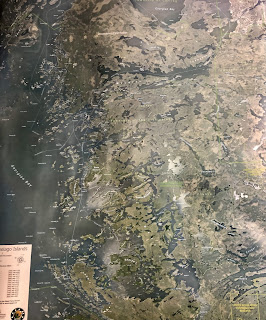 |
| Northern Georgian Bay Islands |
Miraculously, our little tug boat seemed fine mechanically and we cruised into Parry Sound without issue, though slower than our usual 6 miles an hour. We almost cruised right passed the marina, as it was located immediately after a swing bridge. Todd's wife Laurie caught our lines at the launch ramp and soon Todd had his amazing hydraulic lift trailer in the water ready to capture Green Eyes. Laurie and Scott guided the boat onto the trailer bunks and Todd drove the trailer on to shore. He pushed some levers and suddenly Green Eyes was lifted high enough for us to get under her and view the hull. "It's not that bad," we all happily agreed. I mean, the fiberglass was badly chewed in places, but there was no damage to the prop or rudder or bow-thruster. All in all, very good news. It turned out that Todd was the best fiberglass repairman in Parry Sound, so we were lucky there. And Todd and Laurie were so kind. They told us we could stay on the boat and even use the shower in their house during the repair, which would take a week. We were grateful for the offer but after a night of barely manageable heat and humidity on the boat, we moved to the Comfort Inn just out of town where they accepted pets.
 |
| Photo of Green Eyes, high and dry, taken by Laurie |
You might be wondering what Pika did when we hit the rock. She barely lifted her head. But when Scott opened the noisy engine compartment to make sure we weren't taking on water, she freaked. I quickly put her in her carrier, a place she feels safe and sound.
The hotel was just fine. It had a/c and a window that would open for better sleeping at night. From the desk in the room, it had a beautiful view of a small lake. From the couch, it had a view of Walmart. Except for the window ledge where she could watch the birds flying by, Pika didn't like the hotel room much. It thrilled me to see how happy she was when we re-boarded the boat a week later.
Each morning during our hotel stay, we had coffee from Starbucks, which we never do at home, and we visited all the tourists sight in and around Parry Sound in our rental car. We ate at Tailwinds in the shadow of seaplanes and a big moose. We had fish and chips at Herbert's Fishery in Killarney, ate a fabulous lunch at Crossroads in Rousseau, dined at Gilly's, visited the stunning Killarney Provincial Park, and had ice cream at Killarney Outfitters, a cool, kind of REI-type store. In the meantime, Laurie and I discovered we like the same exact wine, and Todd did an excellent job on the fiberglass hull repairs. All's well that ends well and soon we were on our way, much more carefully, through Georgian Bay. We had a couple more sublime anchorages before the weather turned south. We began to worry about getting to Lake Michigan before the ice did. Because of the weather, we had to choose our days carefully.
"We need to make two open water crossings before Killarney," Scott said studying the charts. "The first crossing is 20 miles, the second is about 5 miles." We waited a night at anchor in Alesander Bay for a weather window. Alesander Bay was calm, clear, and quiet. Another night on the hook that ran the risk of lulling us into complacency. We had sundowners on the back deck with our booties on, then Scott relaxed on the couch to study charts and weather forecasts.
When we awoke in the morning at dawn, the bay was dead calm. We raised the anchor and headed out into the channel. In the distance, we could see waves crashing where the waters of Lake Huron met some of the low lying granite islands. "It will probably be alright. It's should be about a three hour crossing," I said looking through the red and green channel buoys to open water. The swell didn't look horrible, but the sky was darkening. The swell would be on our port bow. Not great, but better than if it was coming at us on our side. Green Eyes is like a cork in the water so we are very vulnerable to wind and wave direction. By hour two, Scott was steering directly into the waves, which were beginning to crash strongly over the boat. We traveled up a wave, then down into its trough. When seen through our port window, the larger waves seemed to be half the size of our boat length (twenty six feet) so I estimated they were between 8-12 feet. They were big. And it was raining. And windy. I could see another squall on the horizon coming our way. I put Pika in her carrier with her life jacket. We put ours on too, which was difficult because we couldn't take a hand off the grab bars that sit next to our seats in the helm, not even for one second. After 20 minutes, Scott tacked downwind so we had the waves at our stern, which is still better than hitting us on our side, but which tend to make Green Eyes fishtail in the trough of the waves. We had to choose between a hobbyhorse ride or a waggle. Since waggling was a more direct course, we took it. Green Eyes swished her brand new bottom toward Collins Inlet, sometimes getting a little too close to the waves. In those times, I would simply utter a desperate, "Babe", which meant please, please Captain, turn into the wave because it feels like we are going over. We took comfort in the sentence from a book that is a narrative description of Georgian Bay: "Upon entering Collins Inlet, you can breathe a sigh of relief as the open waters of Georgian Bay will be behind you." After four hours, just as we entered Collins Inlet, I took stock of what had fallen on the floor. I had put the usual small items that sit on the counter--french press, water bottle, coffee mugs--in the sink before we left our anchorage, but there were pillows, books, and hats scattered around the galley floor. Then I looked out the back door windows. I waited until we were in calm water before I said, "I'll take the helm. We have a problem with the dingy," because the dingy had shimmed out of the harness that holds her in place on the davit while we are underway. It was hanging sideways, flat up against the stern of the boat. Lord only knows how long it had been hanging there, bashing against the stern as the boat crashed over the waves. I held the boat in place while Scott MacGyvered a temporary solution. Miraculously, the outboard motor was still attached to the dingy. When he was done, we split a cold ice tea from the cooler to give a chance for our heartbeats return to normal.
"How far is the final crossing?" Scott asked.
"Should be about an hour."
"So much for breathing a sigh of relief. We can't do that again for ten minutes, much less an hour. We'll have to find a place to anchor and try tomorrow," Scott said with determination. I had looked up the suitable anchorages in Collins Inlet the day before. But because Collins Inlet is mostly a straight channel lined with granite walls, there weren't many. The ones I had marked would be wrong for the forecast wind direction.
As we cruised through beautiful, peaceful, protected ten-mile-long Collins Inlet, I prayed that the wind would die so that we could tie up in Killarney that night.
Ninety minutes later we again entered the open waters of Lake Huron. The wind and waves that had been building for 200 miles across the lake hit us immediately. After just a few moments Scott said, "We can't do this." He wanted to turn back, find an sheltered bay, throw out two anchors and hope for the best. It was the right decision. But as we both know now, I have get-there-itis, as dangerous in boating as it is in flying. I also have this thing of hating to go backwards. I was that way when we cycle toured, refusing to turn around if we made a wrong turn. I would just find a new way to get to our destination and go. Scott, on the other hand, has can't-sit-there-itis. He gets antsy when we have to wait out bad weather for more than a few days. "We can't just keep waiting," he'll say. So after a day or two at anchor, even with a lousy forecast, Scott opts to go for it. I vote to stay. I almost never vote for going backwards. These quirks of ours in combination are a perfect storm. The perfect storm we were about to enter.
"It's not so bad," I said. "If we take the waves at this angle, then turn and run into the harbor with the waves behind us at the appropriate time, I think we'll be okay." I'll spare you, but it was much worse than the first crossing. I prayed. I clung to the boat. Scott had to steer with one hand because he had to hang on to the boat with the other. The waves were bigger, the squalls were sharper, and the sky darker. The wind howled. "That came outta nowhere" people in the marina told us after. "It wasn't forecast to be that bad." "I saw you tacking out there. It looked hectic." It was an hour and a half before we neared the protection of Killarney channel. Scott tuned the radio to channel 68 and called Red, the harbormaster at Killarney Mountain Lodge Marina. "We'd like a transient slip for three nights, please. Bow in, starboard tie, if possible," Scott said calmly but loudly to be heard over the wind. Red caught our lines at the dock. Once the boat was secure, Scott and I fell into each other arms. We had been cruising for 12 hours. We were never so happy to be anywhere in our lives.
What about Pika? The world's most resilient boat cat? When I let her out of her carrier, and after kissing her little head five times, she jumped down and rubbed her check over all her usual spots on the boat, drank some water, and had a few nibbles purring the entire time. What a trooper she is!
The three nights at Killarney Mountain Lodge Marina were perfection. Our dockage included use of all the amenities at the Lodge: sauna, pool, kayaks, bicycles, three restaurants, Sunday Brunch, hiking trails, and home-made cinnamon rolls.
We are currently in Gore Bay, waiting out some bad weather (surprise surprise!) before we take our final run in Canadian waters. Our first port of entry into the good old USA should be at De Tour Village, Michigan. It won't be long before I'm enjoying the best soft serve ice cream on the Great Loop in Traverse City Michigan, where our tug boat adventure first began in June of last year.
Scott's phone shouts alerts reminding him of upcoming Ted Lasso episodes. My phone alerts me to weather in the area. While I typed this update, my iPhone began screaming: TORNADO WARNING IN YOUR AREA. TAKE COVER.
Thank you Canada. We have been here only 45 days but you have given us your all.



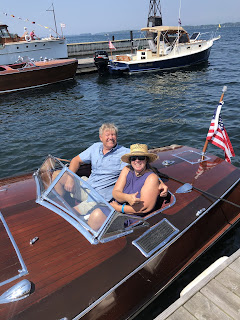








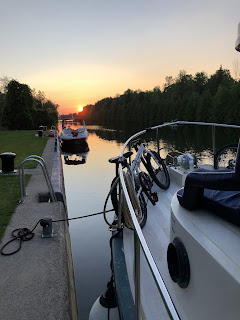









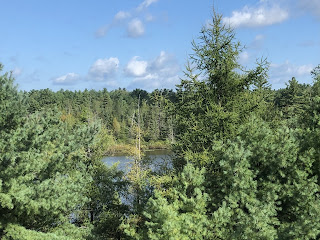



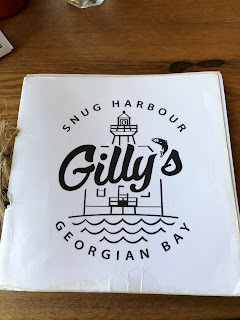













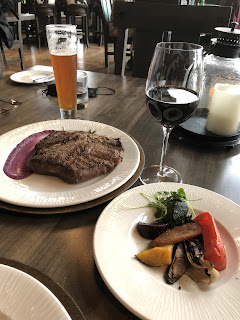













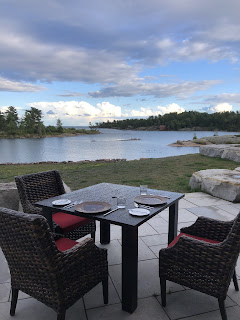


















Fantastic rendition of a most extraordinary adventure! Loved every word of it though I was holding my breath more than once!
ReplyDeleteWow!! Thanks so much for posting of your adventure. I am glad you made it safely.
ReplyDeleteWOW - glad it all worked out, totally enjoyed the read..
ReplyDelete